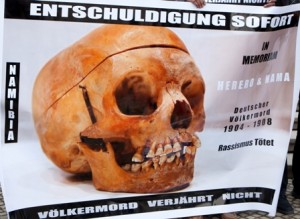Presseerklärung des II. Transnationalen Herero- und Nama Kongresses in Hamburg, 6.-8.4.2018
9. April 2018
II. Transnationaler Herero- und Nama-Kongress
„Koloniales Vergessen: Quo vadis, Hamburg?“
Presseerklärung zum 2. Transnationalen Ovaherero und Nama Congress in Deutschland, vom 6.-8. April 2018 in Hamburg
Wir, die VertreterInnen der Ovaherero und Nama, sowie die Arbeitsgruppe Quo-Vadis-Hamburg?, VeranstalterInnen des 2. Transnationalen Ovaherero und Nama Kongresses in Deutschland, 6. bis 8. April 2018, danken den Menschen der Freien und Hansestadt Hamburg für ihre außerordentliche Gastfreundschaft.
Hamburg spielte eine zentrale Rolle im Zuge des transatlantischen Versklavungshandels sowie in der Zeit des europäischen und deutschen Kolonialismus. Daher begrüßen wir die Haltung der HamburgerInnen, sich der historischen Verantwortung der Stadt zu stellen.
Insbesondere würdigen wir die offizielle Entschuldigung des Senators für Kultur und Medien, Dr. Carsten Brosda, für die entscheidende Rolle der Stadt im Völkermord an den Ovaherero und Nama von 1904 bis 1908.
Ebenso schätzen wir die Entschuldigung des Dekans des UKE, Prof. Koch-Grohmus, im Namen seiner Institution, die aus unethischen und rassistischen Gründen die Friedrichsberger Sammlung menschlicher Überreste der Ovaherero und anderer kolonisierter Menschen übernommen hat.
Wir haben zur Kenntnis genommen, dass das Hamburger Museum für Völkerkunde etwa 1700 Objekte und 1000 Fotografien aus dem ehemaligen „Deutschen Südwestafrika“ (Namibia) in seinem Besitz hat.
Wir begrüßen die Einrichtung des Forschungszentrums „Hamburgs (post-)koloniales Erbe / Hamburg und die frühe Globalisierung“ an der Universität Hamburg und ihre Anstrengungen, transnationale Projekte zu ermöglichen.
Wir möchten die Freie und Hansestadt Hamburg ersuchen, ihren Sitz im Bundesrat sowie ihre politischen Einflussmöglichkeiten auf die Bundesregierung zu nutzen, um die Anerkennung des Völkermords an Ovaherero und Nama herbeizuführen. In diesem Zusammenhang möchten wir auch nachdrücklich auf unseren Wunsch hinweisen, dass der Ovaherero Paramount Chief Vekuii Rukoro und Gaob Johannes Isaack, Chief der Nama Traditional Authorities Association, die Gemeinschaften der Ovaherero und der Nama bei allen Verhandlungen über die Frage des Völkermords vertreten.
Wir freuen uns auf eine ehrliche und konstruktive Zusammenarbeit von Ovaherero und Nama einerseits und der Afrikanischen/Schwarzen Community und weiterer zivilgesellschaftlicher Akteure andererseits mit dem Senat. Diese enge Zusammenarbeit in allen Fragen, die das koloniale Erbe Hamburgs betreffen, sehen wir als unverzichtbare Voraussetzung für einen erfolgreichen Prozess zur Dekolonisierung der Stadt.
Wir, die VertreterInnen von Ovaherero und Nama, sowie die Arbeitsgruppe Quo-Vadis-Hamburg? hoffen sehr, dass die Stadt Hamburg die Zusicherungen des Senats in konkreten Schritten umsetzen wird.
Rückfragen der Medien
Siri Keil Tom Gläser
Tel.: +49 176 620 674 93 Tel: +49 175 414 75 98
Siri.Keil@gmx.de t-a@glaeser-online.org
*******
April 9. 2018
II.Transnational Herero & Nama Congress
„Colonial Amnesia: Quo Vadis Hamburg?“
Press release of the 2nd Transnational Ovaherero and Nama Congress in Germany on April 6.-8.4.2018 in Hamburg
We, the representatives of the Ovaherero and Nama people, as well as the working group Quo-Vadis-Hamburg?, organisers of the 2nd Transnational Ovaherero and Nama Congress in Germany, April 6.-8.2018, wish to express our thanks to the people of the Free and Hanseatic City of Hamburg for their outstanding hospitality.
Hamburg played a central role in the wake of the transatlantic enslavement trade, as well as during European and German colonialism. Hence, we appreciate the sentiments expressed by the people of Hamburg to live up to the city’s full historical responsibility.
In particular, we appreciate the official apology of the Senator for Culture and Media, Dr. Carsten Brosda, for the city’s crucial role in the genocide against the Ovaherero and Nama people from 1904 to 1908.
Additionally, we appreciate the apologies voiced by the Dean of the UKE, Prof. Koch-Grohmus, on behalf of his institution that has taken over the Friedrichsberg collection of human remains of the Ovaherero and other colonised people for unethical and racist reasons.
We have taken notice that the Hamburger Museum für Völkerkunde has about 1700 objects and 1000 photographs from former “German Southwest Africa” (Namibia) in its possession.
We welcome the establishment of the research center, „Hamburgs (post-)koloniales Erbe / Hamburg und die frühe Globalisierung“, at the University of Hamburg and its efforts in making transnational projects possible.
We ask the Free and Hanseatic City of Hamburg to make use of its seat in the Bundesrat, as well as its political influence on the Federal government to bring about the recognition of the genocide that was committed against the Ovaherero and Nama. We also strongly request that the Ovaherero Paramount Chief Vekuii Rukoro and Gaob Johannes Isaack, Chief of the Nama Traditional Authorities Association, represent the Ovaherero and Nama people in any negotiations dealing with the genocide issue.
We are looking forward to an honest and constructive working-relationship of Ovaherero and Nama on the one hand and the African/Black Community and civil society on the other with the senate. We see this close cooperation in all matters that concern Hamburgs colonial legacy as an indispensable precondition for a succesful process of docolonising the city.
We, the representatives of the Ovaherero and Nama people, as well as the working group Quo-Vadis-Hamburg?, fervently hope that the City of Hamburg will follow through with measurable actions on the promises made by the Senate.
Further questions from the media:
Siri Keil Tom Gläser
Tel.: +49 176 620 674 93 Tel: +49 175 414 75 98
Siri.Keil@gmx.de t-a@glaeser-online.org

